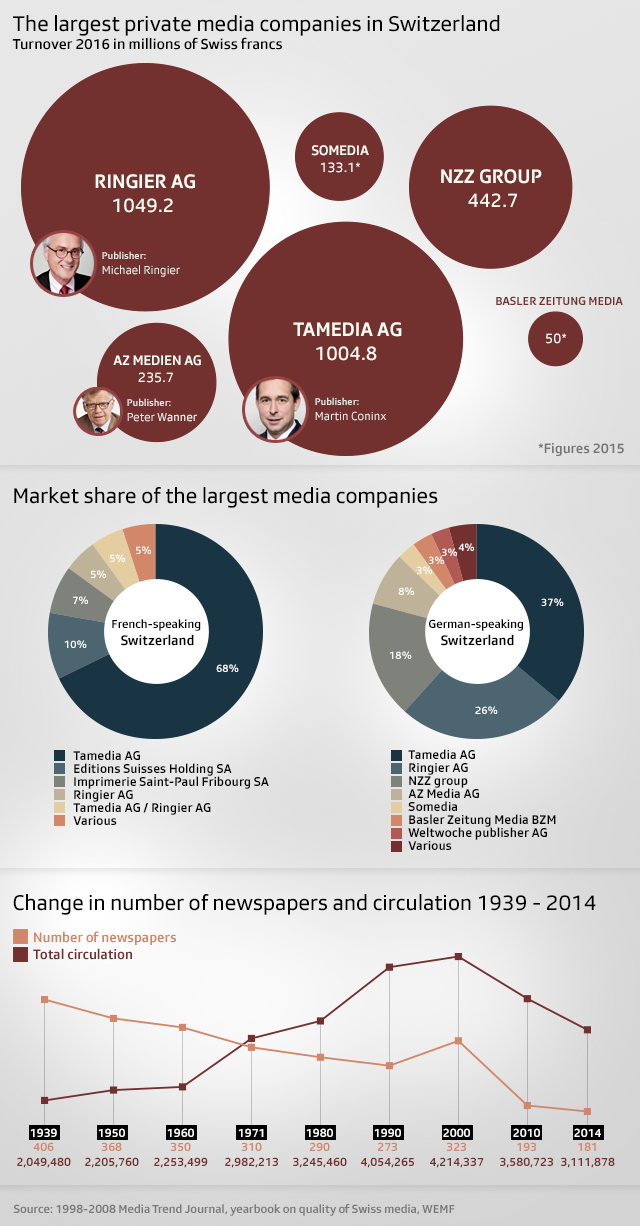Social media is becoming increasingly dominant in the Swiss media industry, controlling not only consumer habits but also the advertising market. In addition, television is dying. These are the findings of the latest “Yearbook Quality of the Media” by the University of Zurich. They are strong, they are dominant, they have money – and they are located outside the Swiss sphere of influence: the internet giants or “tech intermediaries”. They are social media platforms, especially Facebook and Google, that no longer merely serve as a means of keeping in touch with family and friends. In Switzerland, the generation aged 15-24 sees Facebook and Co. as a true news medium: 24% say social media platforms are their main news
Topics:
Swissinfo considers the following as important: Business, Facebook, Featured, Google, Neue Zürcher Zeitung, newslettersent, Swiss Broadcasting Corporation, Swiss Markets and News, University of Zurich
This could be interesting, too:
investrends.ch writes Credit Spreads auf historischen Tiefständen: Sind das Zeichen einer Blase?
investrends.ch writes KI-Ängste erschüttern die Finanzmärkte: Nun werden auch Finanzdienstleister erfasst
investrends.ch writes Google plant Milliarden-Investitionen in Grossbritannien
investrends.ch writes US-Gericht: Google muss Chrome und Android nicht verkaufen
|
Social media is becoming increasingly dominant in the Swiss media industry, controlling not only consumer habits but also the advertising market. In addition, television is dying. These are the findings of the latest “Yearbook Quality of the Media” by the University of Zurich. They are strong, they are dominant, they have money – and they are located outside the Swiss sphere of influence: the internet giants or “tech intermediaries”. They are social media platforms, especially Facebook and Google, that no longer merely serve as a means of keeping in touch with family and friends. In Switzerland, the generation aged 15-24 sees Facebook and Co. as a true news medium: 24% say social media platforms are their main news source, behind the 34% who use online news sites as their main information channel. This means more than half of young media consumers get all their information digitally. |
|
TV: dying slowly but surelyThe generational divide becomes particularly evident when we take a look at television. While TV is still the primary source of information for 40% of users who are 55 and older, this is the case for only 14% of youngsters. A less-pronounced but still clear generational and thus future trend is obvious when it comes to printed newspapers. The shift into the digital sphere as well as the main social media platforms is also an economic one: according to the yearbook, Swiss media providers lag behind social media platforms with regard to data-based advertising. Thus, the lion’s share of Swiss advertising revenues in journalism goes to the likes of Facebook and Google. Additionally, private media houses invest less and less in professional information journalism. Content quality on Facebook is often lowerFacebook also has an impact on the quality of what journalists offer. Because first and foremost entertaining and emotional content is shared and “liked”, online media houses have tended to place this part of their web output on these platforms. This often leads to a qualitative difference between what is offered online and what is offered on social media, the study states. Exceptions are the Swiss Broadcasting Corporation, swissinfo.ch’s parent company, and the Neue Zürcher Zeitung newspaper, which holds its ground with high-quality content also on social media. However, despite this structural change, the researchers generally attribute an increased quality to the Swiss online news portals. In general, in spite of difficult conditions, reporting quality in Switzerland is relatively high: public radio and television lead the field, followed closely by the Sunday newspapers and magazines. |
Largest private media companies in Switzerland |
Tags: Business,Facebook,Featured,Google,Neue Zürcher Zeitung,newslettersent,Swiss Broadcasting Corporation,University of Zurich


